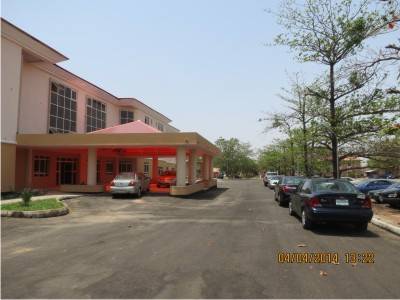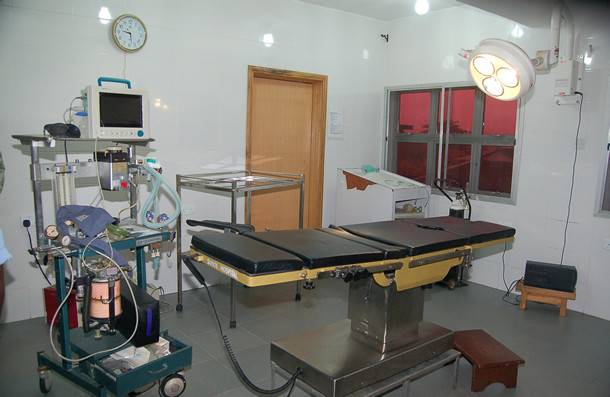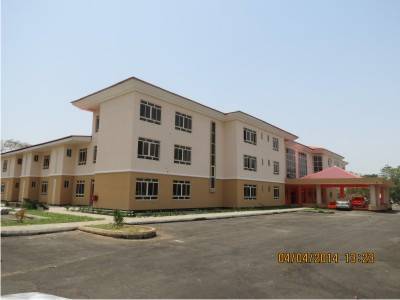University of Abuja Teaching Hospital

About
UATH (formerly Gwagwalada Specialist Hospital) is located in the Gwagwalada Area Council of the Federal Capital Territory (FCT). The foundation stone was laid in 1981 and was commissioned in 1992. It is a 360-bed Hospital with a future goal of extending it to 500 beds, and serves as a reference Hospital for the FCT and surrounding states. The Hospital started as a General Hospital (1992-1993) under the Federal Capital Development Authority (FCDA), was later handed to the Federal Ministry of Health (FMoH) upgraded to Federal Medical Centre/Specialist Hospital in 1993 and approved for a teaching hospital for the University of Abuja in 2006. UATH has a mission to provide affordable qualitative and effective specialist health care and provide clinical teaching in all medical fields. Its vision is to be a world class tertiary health institution by the year 2015.
The hospital has clinics in all the specialty areas, including haematology which provides basic laboratory services complemented by services in clinical chemistry, microbiology, and histopathology departments. The Department of Haematology and Blood Transfusion provides care for all patients with haematological problems, including sickle cell patients who are seen both in the paediatric and haematology clinics, with access to 24-hour emergency through the casualty or children’s emergency unit. The UATH has a well-developed referral system and is a centre for the Midwives Service Scheme (MSS) which provides an excellent platform for outreach services and community-based interventions in SCD through the cluster of primary health care centres linked to the MSS Scheme. Additionally, the hospital has over 70 consultants in major medical and surgical specialties who can deliver different aspects of comprehensive care for patients with SCD. The UATH has an ethical review board that meets once every four to six weeks. The hospital is a centre for a number of international collaborative studies including the H3 Africa Kidney Disease Genomic Study.
Some capacity for genomic research in is being set up in Abuja under the H3 Africa program: a biorepository at the Institute of Human Virology (IHVN) bioinformatics at the National Biotechnology Development Agency (NABDA) and the African Collaborative Centre for Microbiome and Genomics Research (ACCME) at the IHVN. There is also considerable NIH investment in phytomedicine research for sickle cell disease at NIPRID also in Abuja. These projects provide the opportunity to draw upon the expertise and strength of these resources for high quality genomic research in SCD.
The United States National of Heart Lung and Blood Institute recently announced the plan to set up an infrastructure grant in 2016 to strengthen SCD in Africa by building on existing activities in Cameroon, Tanzania, Nigeria, Ghana, Senegal, and Mali etc. by developing centres of excellence hubs in health care and research for sickle cell disease. Sickle Pan African Network (SPAN) was formed in response to the above announcement and Dr Nnodu is the Chair of Advocacy for SPAN and a member of the 10 man steering committee.
This is a well-equipped modern tertiary health facility with a dedicated and well motivated workforce that offers qualitative and effective specialist health care services to all, in addition to providing clinical teachings in all medical fields at undergraduate and post graduate levels.
Services
Best Features
Who Can Visit
Best Time To Visit
Safety
It is a very safe location.What To Bring
["Your medical reports and documents","An overnight bag in case you get admitted","Education materials if you are a medical student"]
Ways Of Travel
By car and motorbike
Reason For Loving Place
Metamorphosed from a Specialist Hospital to a Federal Medical Centre and then to a Teaching Hospital for the University of Abuja, it is a 350-bed hospital with facility for expansion to 500 beds. They offer an extensive range of services including in-patient services, out-patient services, radiological services, pharmaceutical services, laboratory services, nursing services, mobile clinic services, endoscopy services, and even social welfare services.


